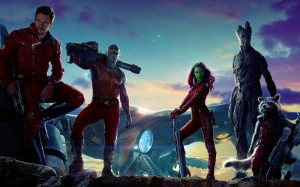The worst thing about making a post-Avengers Marvel movie is how far ahead of the game you are when you start. Your film will be marketed with brute force, treated as arguably the biggest opening of the summer, reviewed everywhere, and very likely to land among the most commercially successful films of the year, whether or not you do anything interesting with it. From a professional development standpoint, it wouldn’t be unreasonable to describe your task as “don’t screw up.” There’s no reason for that not to inspire cautious tiptoeing, for it not to motivate a precise tonal copy of what’s worked in films like Iron Man and The Avengers, and ultimately for it not to lead to a zillion-dollar effort to ensure a solid, uninteresting base hit, creatively speaking.
So it’s particularly surprising how often Guardians Of The Galaxy feels very unlike other Marvel movies and other comic-book movies.
Directed by James Gunn (who also directed the offbeat superhero comedy Super) and written by Gunn and Nicole Perlman, Guardians introduces us to Peter Quill (Chris Pratt), a capable and ambivalent wisecracking thief still working for the aliens who abducted him from Earth as a little boy, shortly after the death of his mother. As wisecracking thieves always do, Quill finds himself in a jam, and not long after, he’s in jail with the mysterious and fearless Gamora (Zoe Saldana), the grief-stricken and huge Drax (Dave Bautista), a big walking tree named Groot (voiced by Vin Diesel) and the particularly mercenary Rocket Raccoon (voiced by Bradley Cooper). They soon find a common purpose, and we’re off. There’s an orb – oh, there’s always an orb – and there’s a preening and pronouncing bad guy (Lee Pace) who speaks at all times as if he’s an action figure being waved around and given voice by a growling kid who’s just recently discovered comics, and there’s a message about the importance of friendship and teamwork.
What distinguishes Guardians Of The Galaxy is its tone, which arrives early in the form of the ’70s mixtapes that Quill got from his mom, which he still blasts on his adored Sony Walkman. After the brief prologue, we first find him kicking and cool-guy-dancing through the puddles of a faraway planet while Redbone’s “Come And Get Your Love” plays. He’s very much a Marvel hero, but Pratt – a tremendously charismatic actor whose work as the huge-hearted and slightly foggy-headed Andy Dwyer on Parks And Recreation foreshadowed some of what he’s doing here – gives him both a shaggier charm and a much more specifically comedic carriage than most Marvel heroes. This is not the suave, swaggering wit of Tony Stark; it is a much more uncertain and blithely goofy thing.

9(MDAxOTAwOTE4MDEyMTkxMDAzNjczZDljZA004))

